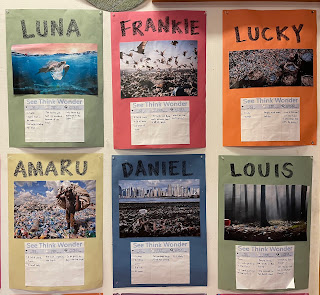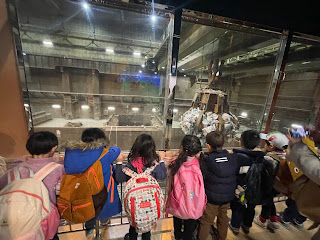25: The Cycle of Inquiry
“Enjoy the little things, for one day you may look back and realize they were the big things.”
-Robert Brault
Each day consists of tiny moments that may seem inconsequential at the time when they happen, but when we look back we realize that they play a big part in shaping who we are.
The cycle of inquiry begins by activating a child’s curiosity through provocations and by giving opportunities for their wonderings to shine. It continues through investigation, exploration, and hands-on experiences, which are all focused on finding the answers to the children's questions. Throughout the process of learning, children are encouraged to reflect on what they’ve learned, how they have learned them, and what has changed in them — whether it’s through the new knowledge they acquired, skills they honed, or values they believe in. At the end of an inquiry, deeper learning is evidenced through the actions that the children will choose to do with what they have learned.
TUNING IN
The start of an inquiry is designed to engage the students in the unit concepts, and to find out what they're interested in learning about. This is where their natural curiosities and wonderings take center stage. Apart from this, Tuning In provides teachers the opportunity to understand the children's misconceptions about a topic, what they value, and their prior knowledge. Have a look at how the kindergarteners tuned in to our unit:
We drew our favorite things about planet Earth.
We drew what we think Sharing the Planet means.
We shared our wonderings through our questions.
FINDING OUT
To dig deeper into an inquiry, the students are given opportunities to engage in their learning by finding out the answers to their wonderings. The Finding Out stage enables the children to use their skills and knowledge to gather new information, and to challenge their ideas, beliefs, and values. Have a look at the engaging learning experiences that the kindergarteners had as they explored how we produce and manage trash:
We read books about the 3Rs.
We watched movies about the 3Rs.
SORTING OUT
The Sorting Out stage is essential to help learners make sense of the information they gathered throughout the Finding Out stage. This allows the children to organize the new knowledge that they acquired so that they can process, retain, and appreciate the significance of what they have learned. Have a look at how the children sorted out the nuggets of information that we learned in this unit:
GOING FURTHER
Concepts are big ideas that have a broad scope. In an inquiry, the Going Further stage gives the children an opportunity to deepen their understanding of a concept and to investigate other areas of personal interest. This stage allows for the learners to engage with the concept from a different lens or perspective, which also adds a deeper dimension to the learning. Have a look at the ways the Kindergarteners went further and deepened their understanding of the 3Rs:
We opened the Hospital of Broken Things. This was our x-ray machine.
We used our recyclable materials and recreated them into things that we love.MAKING CONNECTIONS
Sometimes, the most essential part of the learning process takes place when we pause and reflect on our experiences and freshly acquired information. Making Connections (sometimes called Making Conclusions) allows for the children to revisit how they learned, what they learned, and why they needed to learn them. It's an opportunity to slow down and pinpoint the changes in our skills, knowledge, and values from the time we started with the unit. Have a look at how the children reflected and made connections:
We learned about how to recycle paper.
TAKING ACTION
Student agency is at the core of inquiry-based learning. Giving the children opportunities to have a voice, choice, and to take ownership of their learning are essential elements that make an inquiry work. Taking action and applying the ideas that they have developed throughout the unit is evidence of deeper learning. Connecting the concepts with real-life situations and making a choice to impact the status quo create a more meaningful inquiry. Have a look at the ways the Kindergarteners took action:

12 weeks of learning have passed since we started our inquiry on trash and the 3Rs. Next week, we will end the unit with a grateful heart. There are so many things to be thankful for: the fun experiences, the meaningful lessons, and the relationship that we've built as a class in our second inquiry together while saving the planet one trash at a time.
Have a wonderful weekend, everyone.
Your Kindergarten teacher,
Pam
----
This week, we also celebrated Book Day. Have a look at some pictures that we took during this event:
---
March 2024
- 14Assembly (G2)9:00
- 26 - 29Culture week (Hanami Easter Egg Hunt)
April 2024
- 15 - 19Assessment Week 3
- 19Sports Day9:00-13:00
- 22 - 26Tracker Day 3
- 25Assembly (PS)
- 25Sleep-over (Pre-School – G 2)
-----
Culture Week
March 26 - 29
We will be having a week filled with fun activities, celebrating all the cultures in our school!
More information to follow next week but - we are looking for parents to help out!
You can -
Show or teach games / sports / toys from your country
Play a traditional instrument, teach a song, or create arts and crafts
Teach the students a dance or movements special to your country
Prepare a native dish with the students
If you are interested please let your homeroom teacher know.









































Comments
Post a Comment